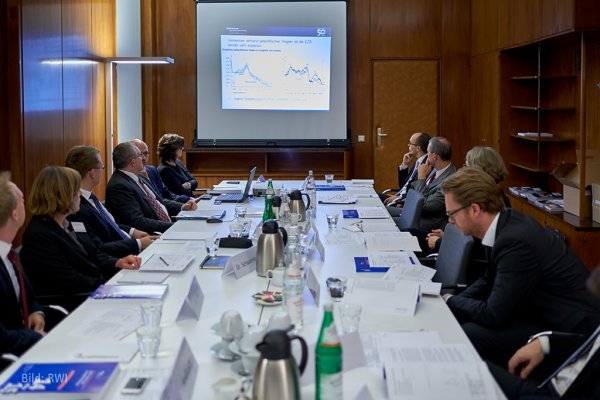Business Culture: Business Meetings
Germany is known for the high quality of its goods, and has one of the most stable economies in Europe. Doing business there can be rewarding in the long run, but be prepared to work hard within the strict cultural framework of the German business world. Germans emphasize efficiency and productivity, and have little tolerance for those who do not meet their standards.
Germans are scrupulous, detail-oriented businesspeople who expect their visiting counterparts to be punctual, formal, and informed. Simple pleasantries may be exchanged, but Germans do not require lengthy personal introductions in order to feel comfortable continuing on to the next stage of business. They will most likely have already researched your company and will rely on your track record and professional achievements—as opposed to your personal relationship with them—to guide them. There is a strict distinction in Germany between personal and professional lives.
Higher education and professional achievements based on merit are held in highest regard, and are considered more important and indicative of competence than inherited status.
Preparation
As in many countries, connections play a key role in the German business world. Who you know can be crucial to the success of your business proposal. Trade shows or chambers of commerce, as well as your embassy, can help introduce you to initial contacts. In addition, German banks are also helpful and can provide insider information about many industries.
Regardless of who introduces you, your German counterparts will probably screen your company before the meeting to familiarize themselves with your product and determine whether you are a suitable business partner.
German markets are highly regulated for quality and environmental safety. The organizations responsible for testing technical or mechanical products are the Technischer Überwachungs-Vereins (TÜVs). TÜVs issue the necessary certificate to allow importation of a product, and you must contact one of them before importing your product. There are TÜV offices in many European countries, in the United States, and in Japan.
Correspondence from your German counterparts will probably be in German, though they will not expect you to respond in German. Letters should be short, formal, and to the point. Address all correspondence to the company, unless you were told to address an individual executive instead.
In addition to an agenda, send ahead detailed background information about your company and your proposal. Include data, spreadsheets, and figures if possible.
Scheduling
Schedule a meeting at least two weeks in advance. If you are meeting with a senior executive, you may need to plan even farther ahead. The best time for meetings is between 11a.m. and 1p.m. If you conduct a meeting too close to closing time, you may not have your counterparts’ full attention.
Avoid scheduling trips for July and August. Most Germans take four weeks of vacation during the summer, and many businesses close down completely for one month. Other times to avoid include Oktoberfest and Carnival, which precedes Lent in Catholic areas.
Germans are extremely punctual. Meetings will start exactly on time. It is best to arrive early and wait a few minutes for the meeting to begin. If you are late, your German counterparts will assume that you are either sloppy or uninterested in doing business with them. Meetings will end on time as well. The positive side to this attitude is that you will not be kept waiting. Also, Germans do not tolerate interruptions during a meeting. You will have the undivided attention of your German counterparts while you make your presentation.
Business Attire
Germans dress formally in the workplace. Men and women wear dark business suits. Women may dress stylishly and can add accessories such as a brooch or necklace, but should not dress in a provocative fashion, which would make their German counterparts take them less seriously.
In the high-tech, fashion, and media industries, casual dress is the norm and it is inappropriate to arrive in more formal attire.
Meeting Protocol
Germans behave with formality in the workplace. Even longtime coworkers often address each other with titles and last names. It is essential that you maintain strictly formal behavior when meeting with your German counterparts. Speak politely at all times. It is even a good idea to ask permission before you take notes.
Entering the Meeting Room: Hierarchy
The senior member of your team should enter the conference room first, followed by the rest of the team in order of rank. German senior executives will expect to be treated formally and with a good deal of courtesy, especially if they are older.
Introductions
Introductions follow a strict protocol. The senior member of your team is introduced first to the senior member of the German team. Then the German senior manager is introduced to your team. Next, your team is introduced to the German senior manager in order of rank, including brief descriptions of their roles and responsibilities. The German manager will then introduce his team. He or she will be seated in the center, with the next senior team member seated to his or her right.
Shake hands when introduced. German businessmen will wait for a woman to extend her hand first. Some German men, especially if they are older and members of the aristocracy, will kiss a woman’s hand upon meeting.
Be sure to provide comprehensive information about your team members as soon as possible after an initial meeting. Your German counterparts will want to maintain ease of contact with your company. Include names, titles, responsibilities, and brief professional biographies for each team member.
Forms of Address
Address others with their proper title and last name. Senior executives may have an aristocratic title in addition to a professional title. You may come across the following titles:
Geschäftsfuhrer (corporate president)
Generaldirektor (general manager or managing director)
Finanzdirektor (chief financial officer)
Direktor (senior manager)
Aristocratic titles may include
Graf (count)
Freiherr (marquise)
Freifrau (marchioness)
Never address your business counterparts by their first name. Expect that it will take a long time before they offer to move to a first-name basis.
The title Miss (Fraulein in German) is generally reserved for girls under the age of 18. Mrs. (Frau) is used for all women, whether they are married or not. If a woman prefers to be addressed as Miss, she should clearly state her title when introduced and print it on her business card.
Business Cards
Business cards are always exchanged at the beginning of a meeting. Your card should list your professional title and role in the company.
Most Germans do speak English, but one side of your card should be translated as a courtesy. Present your card with the German side face up.
Take a moment to peruse your counterpart’s card before putting it carefully away. Do not write on it. Showing respect for the business card indicates respect for the business relationship.
Body Language
Germans occupy more personal space than is customary in American or Asian cultures. Don’t attempt to move closer if you feel that you are too far away, and avoid physical contact beyond an initial handshake.
It is important to appear formal and businesslike at all times. Do not keep your hands in your pockets; this is considered slouching. Also, it is considered bad manners to keep your left hand in your pocket while you shake hands with your right.
Be aware that many Germans smoke, and will do so almost anywhere, including during a meeting. If you have a bad reaction to smoke, it might be better for you to tactfully change seats rather than asking your host not to smoke. If you do ask him to stop, however, he will usually do so.
Meeting Starters: Small Talk versus "Getting Down to Business"
Meetings in Germany are efficient and focused. There is a minimum of small talk, as the main goal of the meeting is to discuss and resolve the business issues at hand. Germans observe a strict separation between business and private life. They will not offer information about their families and you should not inquire. Avoid discussing World War II.
Don’t be surprised if your German counterparts take on a sober, businesslike attitude after initial pleasantries are exchanged. Germans are serious about getting down to business and the change in mood can be swift once the meeting begins. During the meeting there will be few interruptions; further socializing is reserved for follow-up meals or outings. Do not attempt to lighten the mood; your business counterparts will feel that you are wasting their time if you stray from the business discussion.
Conducting the Meeting
Come prepared, down to the last detail. Your presentation should be comprehensive and supported by key facts. Do not give a theatrical presentation—jokes, boasting, or dramatic claims will hold no sway with your German counterparts; let your proposal speak for itself. Germans focus on facts and do not take emotions into consideration when appraising a business proposal. It is considered bad business practice to compare your company’s product to competitors’ equivalents.
A worthwhile approach is to focus on the measurable benefits of your proposal. Personal testimonies and case studies may be helpful in convincing your counterparts of the value of your product or service. Provide visuals to support your statements.
Older German executives from the western part of the country often speak English fluently, while it is common for younger executives from all parts of the country to speak English. Inquire whether you should bring an interpreter to the meeting, and translate all presentation materials into German regardless of your counterparts’ level of English. Germans use sans-serif fonts for their printed material. Avoid using a serif font—it will look strange to them.
Decision Making
Decisions are rarely delivered immediately. Germans take time to consider every aspect of a proposal and do not believe in rushing into a deal before their actions are properly thought out.
German businesses tend to follow a pyramid structure. All decisions are made at the top; those at the middle or junior levels are rarely consulted. It is important, therefore, to focus your efforts on senior executives who have the authority to make decisions regarding your proposal.
Decisions are usually made based on logic and general principles. Decision makers rarely defer to gut reactions or personal feelings.
Gifts and Splitting the Bill
Business gifts are sometimes exchanged, but avoid giving gifts of significant value, which could be construed as bribery. Acceptable choices include a fine pen, a silver picture frame, a pocket calculator, or alcohol. If you are invited to someone’s home, bring flowers or a bottle of wine (not a German vintage, though). Flowers should be given in odd numbers, but not 13. White flowers are only used at funerals, and red roses have romantic overtones.
At a meal, business talk is restricted to before and after the meal. The host generally pays the bill, but after the meal you should extend your own invitation. Don’t press your counterpart to agree to a date on the spot. Instead, offer to be in touch with his or her secretary to set a date. Be aware that it can be difficult to find time for social meetings, as many Germans make quick day trips to other European countries and schedule flights in time to be home for dinner.
Follow-up
After the initial meeting, your German counterparts will take the time to consider your proposal. Should they invite you to a follow-up meeting, the German senior executive will open the meeting and present the company’s response. Their presentation will be supported by facts and figures. They will expect you to take time to consider their answer after this meeting, so it is best to avoid an immediate response.
It might be helpful to arrange for reciprocal visits to each other’s countries. When the German team visits your country, prepare a detailed business schedule before they arrive. In addition, organize a social itinerary that will allow them to tour your region and get to know the culture.
Germans are interested in long-term efficiency and benefits. The serviceability of your product is nearly as important as the quality of the product itself. Plan ahead and determine how you will provide after-sales service once the deal is closed. You may want to consider opening a service center in Germany to increase the marketability of your product.
Copyright © 1993—2025 World Trade Press. All rights reserved.

 Germany
Germany 



